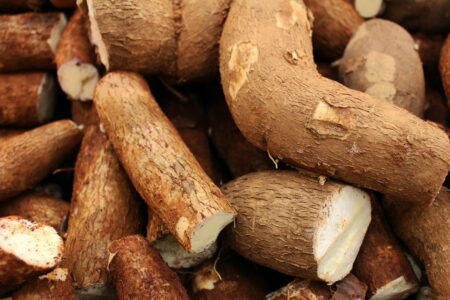Case Study
Accreditation: Unlocking the Potential of Cassava to Promote Economic Development and Fight Hunger and Poverty
Summary
The Nigeria National Accreditation System (NiNAS) collaborated with the Pan African Quality Infrastructure (PAQI) and the African Union to host the first African Cassava Conference in Abuja, Nigeria. The conference provided an opportunity for Africa to explore the potential of the cassava value chain in supporting the Sustainable Development Goals (SDGs) by contributing to the global fight against hunger (SDG 2), the fight against poverty (SDG 1), and industry, innovation and infrastructure (SDG 9). An interesting outcome of the conference was the demonstration of the use of technology to make cassava farming more interesting, and reduce the stress associated with planting, harvesting, marketing, and exporting of cassava, thereby contributing to SDG 8: decent work and economic growth. The role of accreditation in driving the cassava value chain and increasing market access and competitiveness through product certification (ISO/IEC 17065), laboratory testing (ISO/IEC 17025 for quality assurance), quality management system certification (ISO/IEC 17021-1), and inspection (ISO/IEC 17020) was elucidated during the conference. New applications of cassava as a source of green energy, and its uses in several manufacturing processes such as tableting (pharmaceutical grade starch) and production of biopolymers, were discussed.
The National Quality Council (NQC) of Nigeria, the apex quality infrastructure (QI) coordinating office, and key stakeholders in the cassava value chain from Africa (encompassing both public and private sector actors, researchers, farmers, development organizations, quality infrastructure institutions, and investors), came together to share experiences, discuss, and strategize on the full exploitation of cassava-based products, ensuring that standards and quality requirements are addressed through accredited conformity assessment services.
The goal of the conference was to foster collaboration and knowledge exchange among stakeholders, to:
- strengthen the cassava value chain,
- promote its economic benefits,
- enhance food and nutrition security in Africa, and
- expand exports by ensuring that standards and quality requirements are successfully implemented in cassava production.
Specific sessions were devoted to the crucial role of accredited conformity assessment services; information on the International Accreditation Forum Multilateral Recognition Arrangement (IAF MLA) and African Accreditation Cooperation Mutual Recognition Arrangement (AFRAC MRA) was shared. The stakeholders were shown how to access accredited quality management system certification (ISO/IEC 17021-1), product certification (ISO/IEC 17065), certification of persons (ISO/IEC 17024), inspection (ISO/IEC 17020), and testing (ISO/IEC 17025) services, to engender confidence and trust, which will facilitate trade in the cassava value chain.
Background
Cassava is a starchy root crop that is native to South America, but has been cultivated in Africa for centuries. It is an important staple food in many African countries, providing a significant source of carbohydrates and nutrients for millions of people. Cassava was introduced to Africa by Portuguese traders during the 16th century. It quickly adapted to the African climate and became widely cultivated across the continent. The crop thrived in various ecological zones and played a crucial role in food security, particularly during times of drought and famine. Cassava “Manihot Esculenta” is a perennial crop present in most of Sub-Saharan Africa, that has gradually transitioned from a food security crop to a cash crop because of the recent demand for it globally. Cassava is cultivated as food, animal feed, and as an industrial raw material.
Nigeria, leading among the four producers of cassava in Africa (followed by the Democratic Republic of the Congo, Ghana and Angola), contributes between 54% and 61% of the continent’s cassava production. NiNAS has played an important role by ensuring that standards and quality requirements reach the diverse stakeholders involved in the cassava value chain. This unlocks the potential of cassava to provide food nutrition security and become an export product, against the background that before now it was perceived as a staple food.
To assure food security and spur industrial development, the consideration of cassava as a ‘poverty fighter’ was adopted. Cassava has been an important staple food in many African countries, providing a significant source of carbohydrates and nutrients for millions of people. In addition to that, the conference helped in stimulating Africa’s industrialisation, through stakeholder engagement in developing and assuring quality along the cassava value chain.
PAQI began the Cassava Research Project in 2020, with funding from PTB Germany. The purpose of the research was to investigate the role of QI in the value chain. AFRAC managed the accreditation-related process, identifying gaps such as unavailability of enough accredited conformity assessment bodies (CABs) competent in cassava derivatives testing and product certification. AFRAC designed and provided training to stakeholders on cassava product certification (ISO/IEC 17065) and laboratory testing of the derivatives. These training workshops highlighted the value of accredited conformity assessment in assuring safety of foods, confidence of our trading partners, and protection of our environment.
The stakeholders learnt how accreditation reduces the need for multiple inspections of goods and services supplied by accredited CABs. Accreditation also facilitates the development of market linkages by building confidence, enhancing competitiveness, and driving the leveraging of opportunities provided by regional economic integration initiatives, such as the African Continental Free Trade Area (AfCFTA).
Strategy
With the realization that cassava has multiple applications for the fight against hunger, particularly in Africa, and its potential application in industry, PAQI embarked on the Cassava Research Project, and used this conference to provide the platform for stakeholders, government, and researchers to gather to find ways forward. Cassava is not only an important staple food for hundreds of millions of people around the world, especially among lower income communities in Africa and Latin America, but an avenue for fostering international trade to sustain nations’ economies, industrialization of agriculture and significantly reduce unemployment.
Previous strategies included adoption of improved varieties and innovative farming practices, coupled with effective extension services, establishment of small to medium-sized enterprises, and fostering economic empowerment among farmers and processors. Encouraging the adoption of appropriate technology in cassava cultivation and processing in order to improve efficiency, and reduce post-harvest losses, did not yield the desired results. Major contributors to this were the poor implementation of quality assurance measures, including lack of standards enforcement and certification programs. Also, even where certification was used, there was no emphasis on accredited conformity assessment. The outcome of the conference is a better understanding of the role of accreditation in unlocking the potential of cassava to enhance economic development, fight poverty, and fight hunger.
Results and impact
The conference stakeholders, including public and private sector actors, researchers, farmers, development organizations and investors, recognised the role of accredited conformity assessment services as crucial to our fight against hunger and poverty, and to Africa’s industrialisation. There was a consensus among the diverse stakeholders involved in the cassava value chain for developing the value chain through application of accreditation, standards, and metrology.
The goal is to open and strengthen investment opportunities to provide food nutrition security, employment, boost exports, and ensure that standards and quality requirements are addressed.
Contact:
Name: NiNAS Communication Team
Organisation: Nigeria National Accreditation System, NiNAS: PAQI Secretariat and African Union.






